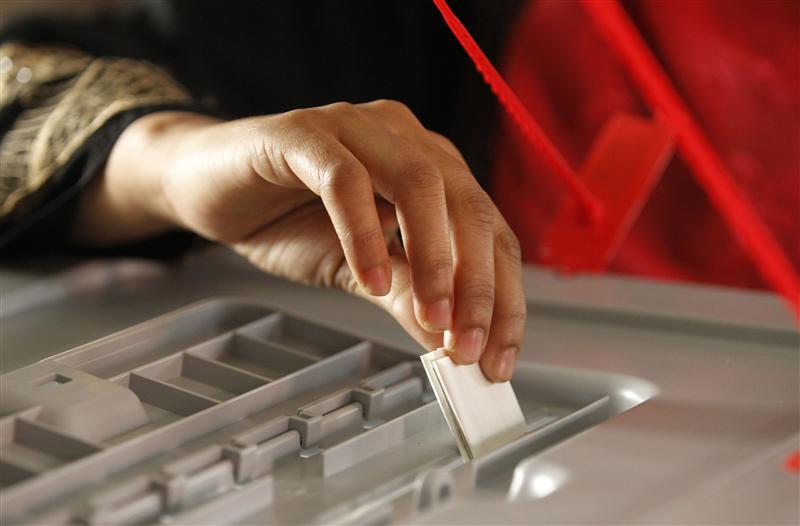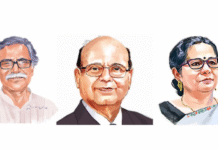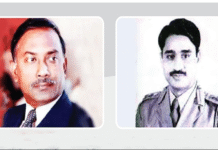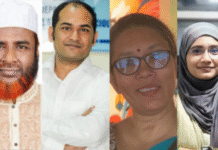The 10th tainted parliamentary election is over not as a traditional festive one. This questionable election has been clouded with violence, arrogance, mysteries, cunning maneuverings, low participation and what not. Innocent lives have been lost. The post-election ‘planned’ violence by miscreants has brutally damaged lives and means of living of some members of the Hindu community in some parts of the country. I find no strongest word to condemn these inhuman actions. Condemnation is neither a cure nor a solace. Punitive actions must be taken without any delay through a fair and thorough fact-finding investigation by a neutral body. At the same time, they must be rehabilitated economically with a strong and enduring sense of security for life and property. Were all these happenings worth anything except the ongoing self-serving power-struggle between the AL and BNP including their political allies? Have they all been consistent at all with the spirit of the Liberation War?
The AL and BNP have been fighting cats and dogs for power for personal monetary enrichment. Cats and dogs are two different species evolving differently. However, they remain loyal and caring in their relationship with the master in a family. They even learn how to co-exist in peace and unity. Can we draw even this analogy for both major political parties? From time to time, the Jihadist Party (Jamaat-e-Islami) has been their kissing darling. Are both parties not responsible for the rise of violence, intolerance and religious fundamentalism? Indeed, they are. Are our politicians with a few exceptions loyal to their Masters (the common people)? Do they really care for them? They certainly do not so in many counts. Most of their actions are wrongly directed in the name of the best interest of the common people (the owners of the country).
To me, the spirit of Liberation War (Mukti Juddher Chetona) as a complex whole includes economic and political freedom, freedom of speech, freedom to practice his/her own religion, equality, fairness, justice, responsibility, transparency in governance, mutual respect and tolerance, common understanding on issues of national vital interests, everybody’s right to live in peace and harmony, and absence of corruption. This is all about Freedom to live and to choose. In reality, we see massive deviations from this very spirit. We as a nation, the news media and the so called civil societies cannot escape the blame shifting all to politicians. We have to take some of the blames too because we are divided along political lines and let politicians get by with their misdeeds. We must rise up unitedly and make our clear and loud voice heard.
Virtually, the election was one-sided. The AL won an overwhelming lopsided victory at least for a short term, though at a heavy loss in the long run as it failed to live up to the ideals of Bangabandhu Sheikh Mujibur Rahman(the Father of the Nation). In our political culture, the winner takes all and the losers face repressions. I pray that the AL does not repeat the history of the BNP and its own in this regard. Let there be reconciliation between them to ensure peace in the national life. For now, AL has an upper hand and BNP is seemingly in great despair and disarray. This is no time for revenge. This is time for engaging in constructive dialogue to find an acceptable and viable solution to get out of the current impasse to hold an inclusive election now or later. In democracy, everyone has a choice to participate or not to participate in elections. BNP chose not to. So, it lost. This is a harsh reality. AL also lost its image as a beholder of democratic values and norms. BNP was outmaneuvered by AL by cunning wits and coercion. So what should come next?
Both parties should take a long breath and reflect. Both must identify their mistakes and take timely corrective steps. BNP needs to regroup, re-energise and reorganise starting at the grassroots level. AL must do the same. Both must reach out to people more than ever before to earn their confidence and respect. Otherwise, their political duopoly will be at high risk. To retain this duopoly, they need each other in one form or the other. In fact, their ideological differences are marginal. They have more commonalities in modes of operations including competitiveness in corruption and coercion.
BNP needs massive doses of insulin as a diabetic patient needs for normal functions of organs. Otherwise, it is likely to turn out as Basically No Party (another acronym of BNP). AL must start repairing the long-run damages to its reputation as the party founded on democratic principles excepting a short period of transformation into BAKSAL. The current government must fairly and wisely complete the unfinished task of the ongoing trials for crime against humanity in a timely manner. The Padma Bridge Project must be undertaken immediately even with domestic funding to provide connectivity to 26 southern districts (representing 40% of the population) with the rest of the world. This will add to the vitality of the economy. The ongoing infrastructural projects must be completed in time. The economic and business pipelines must be unclogged immediately. Maintain close scrutiny on some questionable elements in the newly formed cabinet. At first sight, it looks better to me than the previous one with a mixture of experience and youth. The members of the cabinet must work more and talk less. If so, the party should be able to make a turnaround within a reasonable timeframe.
On the diplomatic front, the hurdles are less than I initially thought of. Strong endorsements by China, India and Russia have provided a big boost to the new government. The Western countries (the so called democracies) have expressed disappointments for the immediate past election and urged both sides for holding a free, fair, inclusive and acceptable election as soon as possible(no deadlines) through immediate constructive dialogues. They have come stronger on an immediate end to violence. None of them rejected the election results outright and declared the government illegal. They also expressed interest in working with the government. AL might see some hope in it. A lot will depend on successful economic and trade diplomacies in the age of globalization. So, the incoming Foreign Minister must be a seasoned diplomat who understands global economic and trade issues. Foreign diplomats in Bangladesh should not be allowed to assert their political clout by unduly meddling into domestic politics. They must be reminded that Bangladesh is a sovereign country. Foreign diplomats must behave within the internationally accepted norms of diplomacy. To be noted, Europe is economically stagnant or in a decaying mode. Asia is rising like a roaring economic tiger. The West must have to continue business with the East for their interest. They have economically divided the world into North and South. This demarcation will get blurred over time. The UNO is very important from global perspectives. Bangladesh should have a strong voice there by placing a seasoned and senior diplomat with self-confidence, diplomatic experience and command over global issues. This should not be a place for Tom, Dick and Harry under a mere political consideration.
To improve the internal law and order situation, the incoming Home Minister must be strong to enforce laws without discrimination. This person must be bold and fair, not revengeful. This person must let chips fall where they must. Restoration of law and order situation is a key pre-requisite to political stability. Political stability is a must for economic and business growths. More importantly, it ensures people to live and earn with mental peace. Mistakes were made on both sides in the past. They must not be repeated any further. Jihadists of Jamaat-e-Islami neither showed any contrition nor they apologised to the nation for their colossal misdeed during the liberation war. They rather still believe they were right. There is no reason to go soft with them. To break their backbone, all foreign and domestic financial arsenals must be cut off. Why can’t this party be banned? Fear of growing underground activities by them is overblown in my view.
To me, Caretaker Government issue is dead. I consider it as an insult to democracy. How can democracy be protected through this undemocratic tool? We saw lots of dramas on both sides with it. It became very controversial in every election held under it. Furthermore, it tarnished the Judiciary. It is a foul cry for its restoration. If necessary, the constitution may be amended to incorporate another viable and agreed upon alternative because constitution is for the well-being of the people. If not, let the current system continue and let the baby grow up. We shall see when opposition comes back to power, this baby will be its darling and a stepchild of AL in opposition. We saw this melodrama with regard to the caretaker government. Nothing will be perfect as democracy is an imperfect system of governing with no better alternative in the offing. We need not worry if we can institute a truly independent and powerful Election Commission without any political interference. At the same time, EC must be staffed with the right people who command respect from all for impartiality and integrity of the highest order. There are some competent and good people in the country. Simply, they have not been given the opportunity to serve in a toxic political environment.
Many social and political ills are the results of some conflicting provisions in the constitution. The original 72-page constitution was written in about a month mainly by Mr. Abdur Rab (an advocate of the Supreme Court) at his Dhanmondi residence and the Constitution Drafting Committee was headed by Dr. Kamal Hossain(the then Law Minister). It was in line with the West Minister System borrowing heavily from the Indian constitution in 1972. The West Minister System itself is a mess with so many ambiguities. The constitution underwent through 15 amendments so far. The decimation of the constitution began with the 4th amendment. This one and the subsequent ones were not well-motivated. They were largely for self-serving political interests. We have political monarchy. Too much power is concentrated in the hands of the Prime Minister with no virtual power vested in the President. The elected MPs are bound to dance to the musical tune of the Prime Minister. They cannot vote on issues based on their moral conscience. They should be freed to vote according to their conscience. Otherwise, they cannot truly represent their constituents. Their role should be limited to legislative matters only. To curb political monopoly of the PM, some special powers should be given to the President for application in extraordinary national political crises. A bicameral legislative system may deserve consideration in line with US/Australian constitution to check legislative abuses in a unicameral legislative system. Term-limit on Premiership may discourage the temptation for political dynasty. Every party must be required to fully democratise its constitution for bottom-up decision making. Otherwise, they will lose party registration with the EC. Now, time has come to re-examine the constitution for its appropriateness and timeliness by constitutional experts in terms of unique socio-economic and political features of Bangladesh.
In closing, we aspire for bold, selfless and dedicated political leadership to address our problems. Boldness in leadership should flow from competence, people’s trust, knowledge, wisdom and self-confidence. Foolish boldness may also originate from ignorance and arrogance. True leadership is not about balancing opposing forces. A true leader should get deep down to the root causes of the problems in order to solve them. Many of the aforementioned may seem utopian and infeasible, given the prevailing political realities in our country. Some of them are bound to stir controversies and eyebrows. These ideas are not new. They have been floating around sporadically for quite some time. At the very end, nothing is impossible if politicians have good intentions, sincerity, resolve and the people’s interest in front of them.
———————————————-
Matiur Rahman is the MBA Director and JP Morgan Chase Endowed Professor of finance at McNeese State University, USA.
Source: bdnews24










